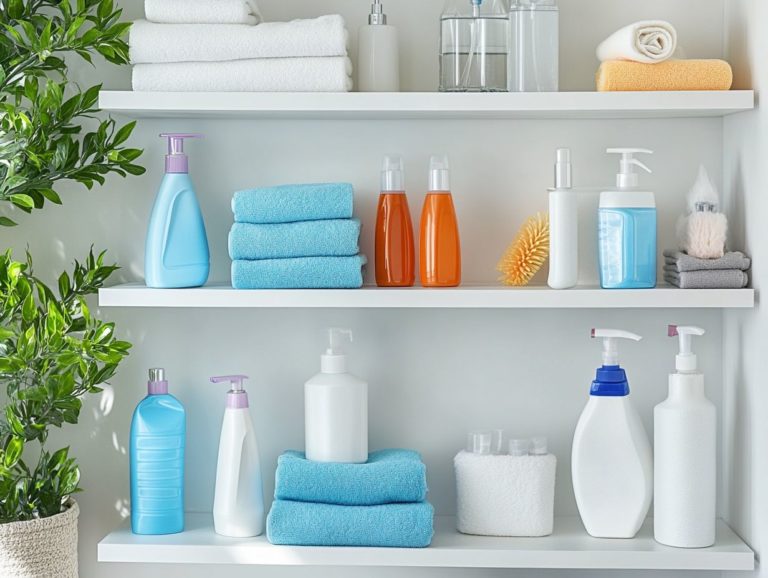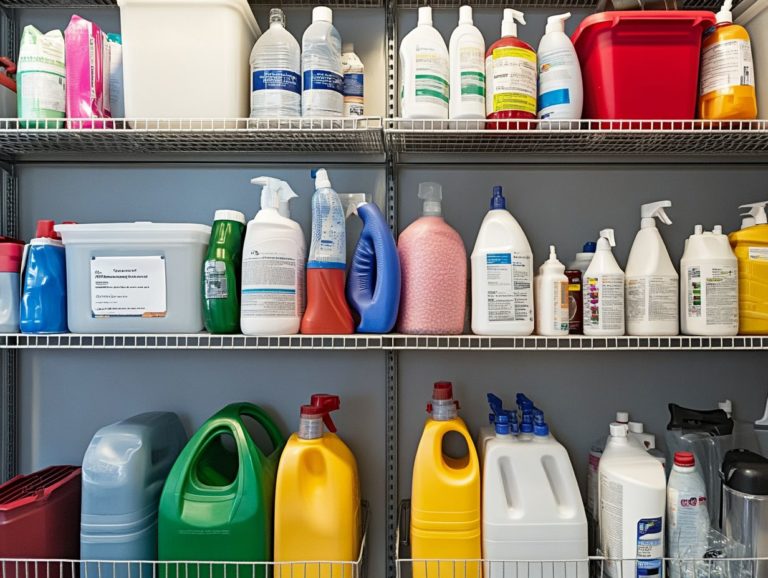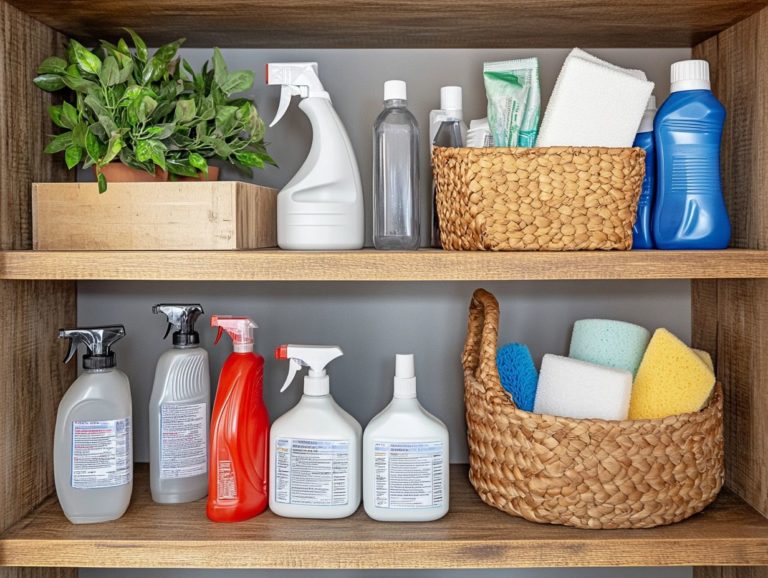How to Store Homemade Cleaners Safely
Are you seeking an eco-friendly approach to maintaining a sparkling clean home? Homemade cleaners not only prove to be effective and budget-friendly, but they also allow you to avoid the harsh chemicals often found in commercial products.
This article explores the many benefits of using homemade cleaners, highlighting key ingredients that you likely already have in your kitchen. You can also find essential safety precautions for their use and storage. You can also find organizing tips to keep your cleaning supplies in designated cabinets or storage closets, ensuring a clutter-free home.
Discover how simple ingredients like vinegar and baking soda can transform your cleaning routine while keeping your family safe. You will also learn about effective methods and ingredients that are part of a natural cleaning approach.
Contents
- Key Takeaways:
- Why Use Homemade Cleaners?
- What Are The Common Ingredients Used In Homemade Cleaners?
- How To Store Homemade Cleaners Safely?
- Ready to Clean Your Home Safely with Homemade Cleaners? Let s Dive into Essential Safety Tips!
- Frequently Asked Questions
- How do I properly store homemade cleaners?
- Can I reuse old containers to store homemade cleaners?
- What is the best way to label homemade cleaners?
- How long can I store homemade cleaners?
- Are there any materials I should avoid when storing homemade cleaners?
- How can I safely dispose of unused homemade cleaners?
Key Takeaways:
- Store homemade cleaners in airtight containers and label them to prevent accidents.
- Keep all cleaning supplies out of children’s reach and store them in a cool, dry place.
- Take necessary safety precautions when using homemade cleaners, such as wearing protective gear and testing on a small area first.
Why Use Homemade Cleaners?
More and more people are turning to homemade cleaners not just for their budget-friendly nature, but also for their ability to keep your home clean without the adverse effects of toxic cleaners. Embrace eco-friendly cleaning methods to improve air quality and overall well-being.
By opting for natural cleaning solutions like vinegar, baking soda, and natural plant extracts that have pleasant smells, you significantly reduce the health risks tied to conventional cleaning chemicals that can jeopardize air quality and your overall well-being. Cleaning experts recommend safe cleaning products that contribute to a healthier living space.
Furthermore, numerous cleaning experts and home editors, including renowned figures like Martha Stewart, advocate for safe cleaning products that are suitable for both children and pets while effectively tackling everyday messes. Cleaning methods endorsed by professionals like Nashia Baker and Lauren Baker provide practical solutions for maintaining a clean home.
What Are The Common Ingredients Used In Homemade Cleaners?
The common ingredients you use in homemade cleaners are not only effective but also eco-friendly, enabling you to maintain a clean home without compromising your health or the environment.
These versatile substances often include:
- Vinegar, which serves as a powerful disinfectant;
- Baking soda, prized for its abrasive properties;
- Lemon juice, celebrated for its natural acidity.
Additionally, incorporating Castile soap, a natural soap made from vegetable oils, and essential oils like tea tree and lavender enhances both the cleaning power and the pleasant fragrances of your DIY solutions. This approach aligns with the recommendations of Good Housekeeping and Better Homes & Gardens.
1. Vinegar
Vinegar stands out as a favored ingredient in homemade cleaners, thanks to its acetic acid content, which serves as a formidable natural cleaning agent a substance that cleans without harsh chemicals. It effortlessly cuts through grime and eliminates bacteria, proving its versatility across a myriad of cleaning tasks. From sparkling windows to pristine countertops, vinegar does it all.
Vinegar also improves indoor air quality, offering a non-toxic alternative to harsh chemical cleaners that can do more harm than good. Avoid mixing vinegar with chlorine bleach or hydrogen peroxide to prevent the release of harmful gases.
You ll love how easy it is to whip up vinegar-based cleaners right in your kitchen! For example, blending equal parts vinegar and water yields an exceptional all-purpose cleaner. Additionally, a combination of vinegar and baking soda works wonders against stubborn stains in kitchens and bathrooms.
Unlike commercial cleaners, which often come with alarming warning labels and overpowering fragrances, vinegar delivers a safe, pleasant solution to use around your family and pets. Always ensure your space is well-ventilated during application to maximize safety and effectiveness.
2. Baking Soda
Baking soda, or sodium bicarbonate the chemical name for baking soda is an essential player in the realm of DIY cleaning. Renowned for its deodorizing and abrasive qualities, it excels at tackling stubborn stains and odors. Use it on its own. Or blend it with other natural ingredients for powerful cleaning solutions for a myriad of surfaces, making it an essential item in your cleaning toolkit.
From refreshing carpets to scrubbing down greasy oven surfaces, this versatile substance has an impressive range of applications to meet your everyday cleaning demands. When you mix baking soda with vinegar, you not only aid in unclogging drains but also unleash a delightful fizzing action that effortlessly lifts grime and debris.
Creating a simple paste of baking soda and water can work wonders on stained countertops, banishing marks without leaving a scratch. You can also sprinkle baking soda onto your carpets and let it sit for a few hours before vacuuming to eliminate pesky odors.
Try it out! With these practical recipes at your disposal, it s evident how baking soda can elevate your ordinary cleaning routines into efficient and effective tasks.
3. Lemon Juice
Lemon juice does more than just bring a zesty aroma to your homemade cleaners; it boasts impressive antibacterial properties thanks to its natural acidity, which expertly breaks down grease and grime. This effectiveness makes it a go-to choice for cleaning kitchens and bathrooms, as well as deodorizing surfaces no wonder cleaning aficionados swear by it.
You can easily mix this versatile ingredient with baking soda to create a powerful scrub for those stubborn stains. Or combine it with vinegar to boost its natural disinfecting prowess. For a swift disinfecting spray, just blend equal parts lemon juice and water in a spray bottle. This vibrant mix tackles odors and dirt with ease!
Perfect for refreshing cutting boards or countertops, this natural solution leaves behind a revitalizing scent, transforming chores into a delightful experience while inviting a clean, fresh atmosphere into your home.
Start your cleaning adventure today with these fantastic natural ingredients!
4. Castile Soap
Castile soap is your go-to plant-based wonder, offering a gentle yet effective cleaning solution for those who prioritize eco-friendliness.
Its exceptional ability to dissolve dirt and grease while being non-toxic and biodegradable makes it perfect for a variety of cleaning tasks from dishes to floors. This allows you to maintain a pristine home without resorting to harmful chemicals.
This versatile soap excels in traditional cleaning. It becomes even more powerful when mixed with other natural ingredients.
For example, when you mix Castile soap with vinegar, you create a formidable all-purpose cleaner that effortlessly tackles stubborn stains and grime.
Blending it with essential oils like lemon or lavender not only enhances its cleaning prowess but also infuses your space with a delightful scent.
Whether you’re sprucing up the kitchen, refreshing the bathroom, or indulging in personal care, the adaptability of Castile soap presents boundless opportunities for embracing a more sustainable lifestyle.
To maximize its benefits, store it properly in a cool, dry location and group similar products in your cleaning arsenal for easy access.
5. Essential Oils
Essential oils elevate your homemade cleaners, infusing them with delightful fragrances while enhancing their antibacterial properties.
They are a remarkable addition to any DIY cleaning solutions. Oils like tea tree, lavender, and eucalyptus are celebrated for their natural cleaning power, helping you cultivate a healthy environment without the health risks associated with synthetic fragrances.
These oils don t stop at just smelling wonderful; they also neutralize odors and purify the air, transforming your living spaces into refreshing havens.
For example, citrus oils such as lemon and orange not only uplift your spirits but also tackle grease and grime with impressive effectiveness.
By incorporating these natural elements, you can create a safe cleaning environment devoid of harsh chemicals. This significantly reduces allergens and pollutants in your home.
The soothing effects of lavender can even aid in stress reduction, turning cleaning from a mundane chore into a rejuvenating experience that nurtures your personal well-being.
For optimal results, follow cleaning recipes that integrate essential oils and other non-toxic ingredients.
How To Store Homemade Cleaners Safely?
Act now to store your homemade cleaners safely and keep your home environment safe!
Storing your homemade cleaners safely is essential for preserving their effectiveness and ensuring a safe environment in your home.
By using airtight containers, you can prevent evaporation and contamination. Placing your cleaners in a cool, dry location helps fend off humidity that could compromise the quality of natural ingredients.
Avoid humidity and ensure proper ventilation to maintain the potency of your cleaning solutions. Remember, good ventilation is key to keeping your space safe!
1. Use Airtight Containers
Using airtight containers ensures that your DIY cleaning solutions, including those made with vinegar and baking soda, remain effective over time.
These containers effectively shield the contents from air and moisture that could compromise the potency of your cleaning solutions.
They not only help maintain the quality of natural ingredients like essential oils and vinegar but also minimize the risk of spills and contamination.
When you’re selecting airtight containers, it s wise to choose glass or food-grade plastic. These materials are non-reactive, ensuring that the integrity of your contents remains intact.
Plus, having containers in various sizes is ideal for accommodating different types of homemade cleaners. Smaller containers are perfect for concentrated solutions or essential oil blends, while larger ones are great for bulk storage of all-purpose cleaners.
Opting for opaque or darker-colored containers can further safeguard your formulas by blocking light exposure.
If you want to ensure longer-lasting freshness, consider containers with silicone seals, as they provide an extra layer of protection against air infiltration.
For efficient home organization, you can store these containers in a designated cabinet, under sink areas, or even in a storage closet to keep everything tidy and accessible.
Start organizing your cleaning supplies today for a fresher, safer home!
2. Label Containers
Labeling your containers for homemade cleaners is an essential step in organizing your cleaning supplies effectively. It helps you quickly identify the contents and their intended use. Clear labels ensure that everyone in your household understands the purpose of each solution, promoting safe storage practices and preventing accidental misuse.
Opt for waterproof labels to keep that critical information intact, even in damp or humid environments. This enhances their longevity. Implement a color-coding system to take your organization to the next level. For example, assign distinct colors for kitchen, bathroom, and general-use cleaners for quick identification.
This systematic approach greatly enhances organization and clutter management. It enables you to locate necessary items swiftly. Ultimately, this boosts the efficiency of your cleaning routines and fosters a safer environment by minimizing the risk of improper handling of cleaning supplies.
To prevent cleaning mistakes, group products based on their use. This ensures that you always select the appropriate cleaner for the task at hand.
3. Keep Out of Reach of Children and Pets
To ensure the safety of your children and pets, keep homemade cleaners out of their reach. Even natural ingredients can pose health risks if ingested. Store these cleaners in high or locked cabinets or designated storage areas to prevent accidental exposure and create a safer home environment.
Proper storage is crucial. Use child-proof locks to secure the areas where you keep your cleaning supplies. It’s also beneficial to talk about the importance of not tampering with these materials as your children grow older, fostering a culture of safety in your home.
Choose non-toxic, child-safe cleaning products to dramatically reduce risks. Regularly review and minimize the number of cleaning supplies you have on hand to avoid clutter and potential hazards. This reinforces safety while maintaining an orderly living space. Store cleaning products in garage storage or vertical space to maximize your safe storage options.
4. Store in a Cool, Dry Place
Storing your homemade cleaners in a cool, dry place is essential for maintaining their effectiveness. After all, heat and humidity can degrade the natural ingredients you ve carefully chosen. Steer clear of areas with extreme temperature swings or moisture to ensure that your cleaning solutions remain potent and ready for action.
Keep cleaners in kitchen cabinets away from the stove, where heat tends to linger. Place them on bathroom shelves that are well-ventilated to prevent moisture buildup. A consistently climate-controlled closet or pantry offers a perfect sanctuary for these products. Don t let direct sunlight ruin your hard work store your cleaners smartly!
By being attentive to these environmental factors, you will extend the lifespan of your cleaning products and enhance their effectiveness when it s time to confront stubborn stains. Avoid humidity and organize cleaning areas to keep your cleaning arsenal ready for use.
5. Avoid Mixing Certain Ingredients
It’s essential to avoid mixing certain ingredients when crafting homemade cleaners. Some combinations can trigger harmful reactions or undermine your cleaning effectiveness. Understand which ingredients are safe to mix like vinegar and baking soda and which ones should remain apart to develop cleaning routines that are both safe and effective.
For instance, the dynamic duo of vinegar and baking soda can be a powerful ally against tough grime with their fizzing reaction. However, be cautious: mixing bleach with ammonia generates toxic chloramine vapors, posing serious health risks. Similarly, combining different commercial cleaners can lead to dangerous chemical reactions. This highlights the importance of following guidelines.
Always read labels and familiarize yourself with safe practices for homemade cleaning solutions to prevent potentially hazardous encounters. Consulting cleaning experts or a professional organizer can offer additional insights into effective and safe cleaning methods.
By doing this, you foster a safer environment for yourself and your loved ones while achieving impressive cleaning results.
Ready to Clean Your Home Safely with Homemade Cleaners? Let s Dive into Essential Safety Tips!
Using homemade cleaners requires safety precautions. This keeps you safe and ensures a pleasant cleaning experience. Always wear protective gear such as gloves and masks when handling concentrated solutions.
Ensure your cleaning areas are well-ventilated. Always test your cleaners on small surfaces before applying them more broadly. This practice helps prevent unintended damage, allowing you to clean with confidence.
1. Wear Protective Gear
Wearing protective gear is a fundamental safety measure when using homemade cleaners. It shields your skin and respiratory system from potential irritations or allergic reactions. Equip yourself with items like gloves, goggles, and masks to guard against direct contact with strong natural ingredients.
When working with vinegar or baking soda both of which can cause skin irritation with prolonged exposure donning durable gloves is essential. Goggles protect your eyes from splashes during mixing. Masks filter out strong fumes, safeguarding your lungs.
Customize your protective gear according to the cleaning task at hand. Different substances present varying levels of hazard. By prioritizing safety, you enhance your well-being and contribute to creating a healthier home environment. DIY cleaning can be fun and effective as long as you follow proper safety measures.
2. Test on a Small Area First
Before applying homemade cleaners to larger areas, it s wise to conduct a test on a small, inconspicuous spot. This precaution helps ensure there are no adverse reactions with the surface material. Not only does this practice protect your surfaces, but it also allows you to evaluate how effective your cleaning solution is.
This proper testing helps you pinpoint concerns related to different surfaces, whether it s wood, fabric, or tile, as they might react differently to certain ingredients. Start by mixing a small batch of your cleaner and applying it gently to the chosen area. Watch for any immediate changes in color, texture, or sheen.
By taking this precaution, you significantly reduce the risk of lasting damage and enhance the overall effectiveness of your cleaning process. This practice ensures your surfaces are clean and well-preserved. Many cleaning experts, like Martha Stewart, recommend this method.
3. Follow Proper Dilution Instructions
Get it right the first time! Following proper dilution instructions not only protects you but also ensures your home shines. Mixing ingredients with water in the right amounts is crucial for achieving the desired effectiveness while ensuring safety.
For example, a typical all-purpose cleaner often relies on a dilution ratio of 1:10 mixing one part vinegar with ten parts water. Using too much vinegar can lead to a harsh smell and potential skin irritation. On the flip side, not enough vinegar could leave grease lingering stubbornly on your surfaces.
A baking soda-based scrub typically uses a 1:1 ratio with water for a gentle abrasive cleaner. A stronger mixture can scratch surfaces.
It’s essential to follow these ratios. Improper mixing can compromise efficacy and lead to unwanted chemical reactions, safety hazards, or damage to your surfaces. Clear and concise recipes for your homemade cleaners are crucial. Organizing tips from a professional can also ensure your cleaning supplies are always ready to use.
Follow these tips to enjoy a safer, more effective cleaning experience! Your home deserves only the best.
4. Safely Get Rid of Unused Cleaners!
Proper disposal of unused or expired homemade cleaners is vital for safety at home. Avoid pouring them down sinks or toilets; this can cause plumbing problems and harm the environment. Instead, check local guidelines for safe disposal.
Many communities have clear rules about throwing away dangerous items. Check your local waste management website for helpful information. Keep cleaners in their original containers so you can easily read the labels. Rinse out containers before recycling to remove any leftover cleaner.
Join community collection events for hazardous materials. These events help ensure safe disposal and contribute to a cleaner environment for everyone!
5. Keep Cleaners Away from Kids and Pets!
Store your homemade cleaners safely, away from children and pets. Even natural ingredients can be harmful if swallowed. Place cleaners in high cupboards or lockable cabinets to prevent accidents.
Talk openly about safety with everyone in your family. Create a storage area for cleaning supplies that kids and pets can t access. Regularly discuss the importance of these measures, so children understand the risks, even with natural products.
Role-playing safety drills can improve awareness and encourage responsible behavior. This ensures a safer home for all!
Frequently Asked Questions
How do I properly store homemade cleaners?
Store homemade cleaners in a cool, dry place away from sunlight for the best results. Label all containers clearly with the ingredients used and the date they were made.
Can I reuse old containers to store homemade cleaners?
It is not recommended to reuse old containers for storing homemade cleaners unless they have been thoroughly cleaned and are made of a material that is safe for storing cleaning products. It’s best to use new, clean containers to avoid any potential chemical reactions.
What is the best way to label homemade cleaners?
The best way to label homemade cleaners is to write the name of the cleaner, all of the ingredients used, and the date it was made. This will help you keep track of what’s in each container and when it was made.
How long can I store homemade cleaners?
The shelf life of homemade cleaners can vary depending on the ingredients used. Generally, most homemade cleaners can last for several months if stored properly in a cool, dry place. However, it’s always best to make smaller batches and use them within a few weeks for optimal effectiveness.
Are there any materials I should avoid when storing homemade cleaners?
Yes, there are certain materials that should be avoided when storing homemade cleaners. These include metal containers, as they can react with certain ingredients and cause them to lose their effectiveness. It’s best to use non-reactive containers such as plastic or glass.
How can I safely dispose of unused homemade cleaners?
If you have leftover homemade cleaners that you no longer need or want, there are a few ways to safely dispose of them. You can dilute them with water and use them as a general cleaner, pour them down the drain with plenty of water, or take them to a hazardous waste collection facility in your area.




